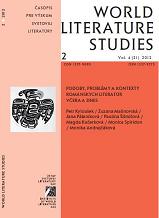„Indiánský Orfeus“ u Leonarda Cohena (Beautiful Losers) a Jacquesa Ferrona (Le Ciel de Québec)
„Indian Orpheus“ in Leonard Cohen’s Beautiful Losers and Jacques Ferron’s Le Ciel de Québec
Author(s): Petr KyloušekSubject(s): Literary Texts
Published by: SAV - Slovenská akadémia vied - Ústav svetovej literatúry
Keywords: Cultural Syncretism. Indian Mythology. Leonard Cohen. Jacques Ferron. Otherness.
Summary/Abstract: The multicultural situation of Canada frequently involves cultural syncretism, which is not only a matter of blending modern and postmodern, but has also its historical dimension. Since the 60ies of the 20thcentury this cultural integration concerns also indigenous Indian cultures, including the mythological ideas of syncretism. The mythology of the First Nations has often been assimilated to the European archetypes, as the narrative of the travel of the souls to the Village of the Dead shows. Written down by the Jesuit missionary Jean de Brébeuf, this Wendat myth has been incorporated into modern literary creation, which is demonstrated in two examples: the novel Beautiful Losers (1966) by the Anglophone Montreal writer Leonard Cohen and the one by the Quebecois writer Jacques Ferron, Le Ciel de Québec (1969). Both authors treat the Indian theme as a manifestation of Otherness facing the History, both also reflect the conflicting situation of the Quebec national emancipation in relation to other anglophone provinces of Canada. While Beautiful Losers put stress on the individual Otherness and on the right to individual rebellion against History, Le Ciel de Québec integrates the Wendat myth into a new aetiological myth relating to the birth of modern Quebec culture.
Journal: World Literature Studies
- Issue Year: IV/2012
- Issue No: 2
- Page Range: 3-14
- Page Count: 12
- Language: Czech

